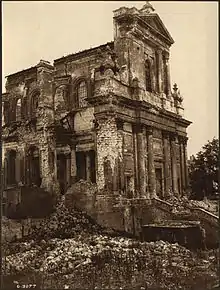Arras Cathedral
Arras Cathedral (French: Cathédrale Notre-Dame-et-Saint-Vaast d'Arras) is the Roman Catholic church in the city of Arras, France. The cathedral is the seat of the Bishops of Arras.
| Cathedral of Our Lady and Saint Vaast Cathédrale Notre-Dame-et-Saint-Vaast | |
|---|---|
.JPG.webp) Arras Cathedral | |
| Religion | |
| Affiliation | Roman Catholic Church |
| District | Diocese of Arras |
| Rite | Roman |
| Ecclesiastical or organizational status | Cathedral |
| Location | |
| Location | Arras, Pas-de-Calais, France |
| Geographic coordinates | 50°17′35″N 2°46′29″E |
| Architecture | |
| Architect(s) | Pierre Contant d'Ivry |
| Type | Church |
| Style | Gothic, Classical |
The original cathedral of Arras, constructed between 1030 and 1396, was one of the most beautiful Gothic structures in northern France, until it was destroyed in the French Revolution.[1] The cathedral was the resting place of Louis de Bourbon, Légitimé de France, a legitimated son of Louis XIV and Louise de La Vallière.
The church of the former St. Vaast's Abbey was rebuilt in classical style as a replacement cathedral. The design was chosen by the former abbot of St. Vaast's, the Cardinal de Rohan, and is of remarkable simplicity. It is 'a very large building, the erection of which was begun in 1755 from plans by Pierre Contant d'Ivry, the architect who later created designs for the Church of La Madeleine in Paris. The work was interrupted during the Revolution, then resumed by virtue of a municipal decree dated “Nivôse 27, Year XII”, which ran: “... to erect the edifice, abandoning everything in the original plans connected with decoration and architectural beauty, limiting the work to the requirements of solidity and decency.” The church was finished in accordance with these prescriptions, being completed in 1834. The interior was of plaster-coated brickwork, whilst the columns were of undressed stone, covered with stone-coloured mortar. The capitals were of stucco-work.'[2]

Arras Cathedral was heavily damaged by shelling in April 1917, during the run-up to the Nivelle offensives of World War I,[3] and subsequently rebuilt in its previous form.
The cathedral is adjacent to the Musée des beaux-arts d'Arras, formerly the Benedictine Abbey of Saint-Vaast.
References
- abelard (25 May 2010). "What was the Cathedral like before the Revolution?". abelard.org. Retrieved 21 January 2015.
- abelard (25 May 2010). "The Cathedral of St. Vaast". abelard.org. Retrieved 21 January 2015.
- Meyer, G.J. (2007). A World Undone: The Story of the Great War, 1914 to 1918. Delta. p. 532.
| Wikimedia Commons has media related to Arras Cathedral. |
